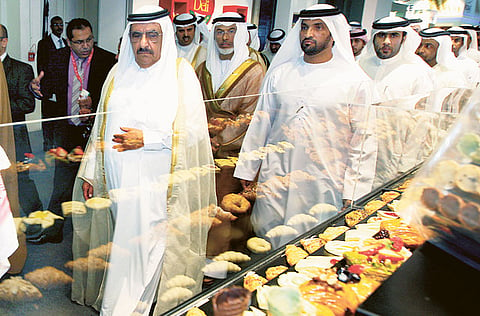Rising prices and food scarcity 'present risks, opportunities'
Hamdan inaugurates Gulfood attended by firms from 88 countries

Dubai: Rising commodity prices and food scarcity are posing both risks and opportunities to import-dependent Gulf countries, said Shaikha Lubna Al Qasimi, UAE Minister of Foreign Trade.
Amid the urgency of securing sustainable food sources, there is also a chance for the UAE to develop as a hub for food re-exports and investments, Shaikha Lubna said at Gulfood 2012 yesterday.
The event was inaugurated yesterday by Shaikh Hamdan Bin Rashid Al Maktoum, Deputy Ruler of Dubai and Minister of Finance, in the presence of Shaikha Lubna.
"Such a well-defined and comprehensive platform is exactly what we need, given the importance of food security, the uplifting of local industries and the reduction of food imports to our regional agenda," she said in her opening speech at the Food Leaders summit titled "International flavours, world-class business".
Amid mounting concerns over Europe's debt crisis and soaring commodity prices, international food companies descended on the Gulfood exhibition as an opportunity to sell their exports to the UAE, which imports about 80 per cent of its food supplies.
UAE food imports are expected to jump $8.4 billion (Dh30.82 billion) by 2020, Shaikha Lubna said. A surging population will drive this growth as food consumption increases by 5.4 per cent annually from 7.8 million tonnes in 2011 to 9.7 million tonnes in 2015. The UAE spends about $3 billion on importing 80 per cent of its food and is, therefore, closely monitoring fluctuations in price and supply, she added.
But the UAE is also a "favourable destination" for food business and investments, Shaikha Lubna said.
The UAE is the Gulf's second largest food market and accounts for just over 18 per cent of the GCC's total food consumption, securing the largest share of industrial food production in the region that estimated at $9.5 billion, she said.
Re-exports
Food demand in the UAE could rise by up to 10 per cent this year as it re-exports some of these food supplies to sanction-strangled Iran and other countries in the region, food manufacturers said on the sidelines of Gulfood.
"We could see demand for food increase by 5 per cent to 10 per cent in the UAE because it does not just feed the domestic market but also neighbouring countries. Sanctions on Iran mean that food is imported into the UAE and re-exported to Iran," Essa Al Ghurair, Chairman of Al Ghurair Foods and Al Ghurair Resources, told Gulf News.
The UAE is a top re-exporter of rice and a major hub for re-exports of tea and coffee.
"As a re-exporting hub I would like to note that our opportunities lie beyond just direct trade of food; we offer the full spectrum of food business prospects, from machinery and logistics to food services and investment mechanisms, all of which will be addressed by this conference," said Shaikha Lubna.
The less tasty prospect is the increasing commodity prices globally that had food manufacturers groaning under the added costs.
Agthia, the Abu Dhabi-based food producer, saw its profits decline 25 per cent as soaring commodity prices ate into their profits.
The rising prices of PET, a type of plastic derived from oil, at 50-60 per cent and grain at 42 per cent "severely impacted" the company's profits, said Fasahat Beg, General Manager of the Consumer Business Division at Agthia, during an interview at Gulfood.
Specialised programmes
It is now monitoring prices carefully, sourcing raw materials better and consolidating the business after the launch of products such as Yoplait, he said.
As businesses seek new opportunities in a difficult market, Gulfood appeared busier than last year during its first day.
The four-day event, which ends on February 22, had 3,800 companies from more than 88 countries doing brisk business during the opening. A record 110 national pavilions are trying to get a bite of this lucrative market. More than 1,080 new exhibitors are taking part in Gulfood this year. The event includes specialised programmes that reflect the industry's latest trends: Food Leaders summit highlights keys to leadership success, Foodpreneur Forum will offer practical advice on new market development or product launch and the food processing packaging forum discusses key challenges in today's economy.
The Gulfood workshop on franchising will offer a session on food franchising by industry experts and will familiarise delegates with options and feasibility issues.
The Gulfood awards will reward achievements and innovations in the region's food and drink industry. This year, 20 categories will be judged.
Sign up for the Daily Briefing
Get the latest news and updates straight to your inbox



